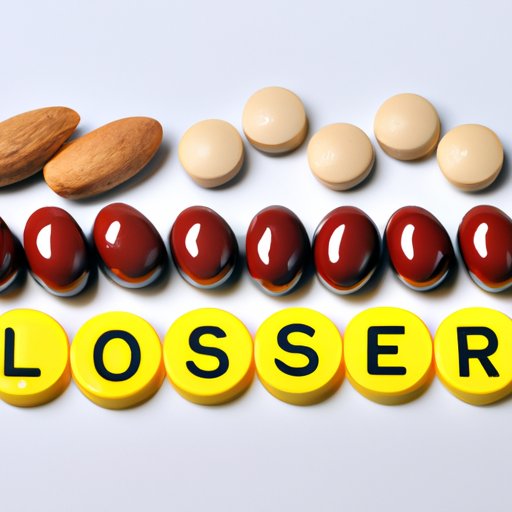
I. Introduction
Cholesterol is an essential substance needed by the body to function properly, but not all cholesterol is bad. There are two types of cholesterol in the body, low-density lipoprotein (LDL) cholesterol, and high-density lipoprotein (HDL) cholesterol. LDL cholesterol is often referred to as “bad” cholesterol as it can build up in the walls of arteries, leading to serious health problems such as heart disease. HDL cholesterol, on the other hand, is often called “good” cholesterol as it helps to remove LDL cholesterol from the bloodstream, reducing the risk of heart disease. Maintaining healthy levels of good cholesterol is essential to overall health and well-being.
Unfortunately, common lifestyle habits such as a sedentary lifestyle, unhealthy diet, smoking, and excessive alcohol consumption can lower good cholesterol levels. In this article, we will explore various ways to increase good cholesterol naturally for a healthier lifestyle.
II. Diet Changes
Dietary changes are an essential first step in increasing good cholesterol levels. Not all fats are bad for you, and incorporating more healthy fats into your diet is key to improving the levels of good cholesterol. Some examples of foods rich in healthy fats are avocados, nuts, olive oil, and fatty fish such as salmon. Replacing unhealthy fats such as saturated and trans fats with these foods can lead to significant improvements in HDL levels.
Including more plant-based foods in your diet can significantly improve overall health, including increasing good cholesterol levels. Legumes, fruits, vegetables, and whole grains are excellent sources of fiber, which is essential for heart health. Foods high in fiber can also help to lower LDL cholesterol levels, reducing the risk of heart disease.
To incorporate these foods into your diet, try adding avocado to your sandwiches, snacking on nuts, and making salmon a weekly dinner staple. Consider replacing white rice with brown rice or quinoa, adding vegetables to your morning omelet or smoothie, or having berries for dessert.
III. Exercise
Exercise is another effective way to increase good cholesterol levels. Studies have shown that regular exercise can raise HDL cholesterol by up to 10 percent. Physical activity can also help to improve overall heart health, reduce blood pressure, and help with weight loss. Even small changes in physical activity, such as taking the stairs instead of the elevator or going for a daily walk, can lead to significant improvements in cholesterol levels.
Include both aerobic and resistance exercises in your routine for optimal health benefits. Aerobic exercise can include activities such as running, cycling, or swimming, while resistance exercises like weight lifting or resistance bands can help to build muscle mass and improve good cholesterol levels. The key is to make regular physical activity a habit, aiming for at least 30 minutes of moderate-intensity exercise most days of the week.
IV. Supplements
Supplements can also be an effective way to increase good cholesterol levels. Some supplements that have been shown to be effective include fish oil, niacin, and plant sterols and stanols. It’s important to note, however, that supplements may not be suitable for everyone, and it’s always best to consult with a healthcare professional before taking any supplements.
Fish oil supplements contain omega-3 fatty acids, which are essential for heart health. Niacin, also known as vitamin B3, can raise HDL cholesterol levels by up to 35 percent when taken in high doses. Finally, plant sterols and stanols are naturally occurring substances found in plants that can help to lower LDL cholesterol levels.
V. Quit Smoking
Smoking is a significant risk factor for heart disease and can lead to lower good cholesterol levels. Quitting smoking can lead to significant improvements in HDL cholesterol and overall heart health. There are a variety of resources available to help you quit smoking, such as nicotine replacement therapies, support groups, and counseling services. Speak with your doctor to find a plan that works for you.
VI. Reduce Trans Fat Intake
Trans fats can lower good cholesterol levels, making it essential to reduce the intake of foods that contain trans fats. Trans fats are often found in processed foods, fried foods, and baked goods such as cakes and cookies. Instead, try swapping these foods out for healthier alternatives such as fresh fruits and vegetables, nuts, and whole-grain snacks.
VII. Incorporate Fiber
Increasing intake of fiber-rich foods can significantly improve good cholesterol levels. Fruits, vegetables, and whole grains are excellent sources of fiber and can be easily incorporated into your diet. Try swapping out processed foods for whole-grain alternatives, such as brown rice or quinoa. Add a serving of vegetables to your meals, and snack on fresh fruits like berries or oranges throughout the day.
VIII. Reduce Alcohol Consumption
Excessive alcohol consumption can lower good cholesterol levels and increase the risk of heart disease. For optimal health benefits, it is recommended to limit alcohol consumption to one to two drinks per day for men and one drink per day for women. Alternatively, choose healthier alternatives to alcohol, such as sparkling water or herbal tea.
IX. Conclusion
In conclusion, there are various ways to increase good cholesterol levels naturally. Making simple changes to your diet, including regular physical activity, and quitting smoking can lead to significant improvements in HDL cholesterol. Similarly, incorporating foods high in fiber and choosing healthier alternatives to alcohol can help to improve heart health and overall well-being. Remember to consult with a healthcare professional before making any significant lifestyle changes.





